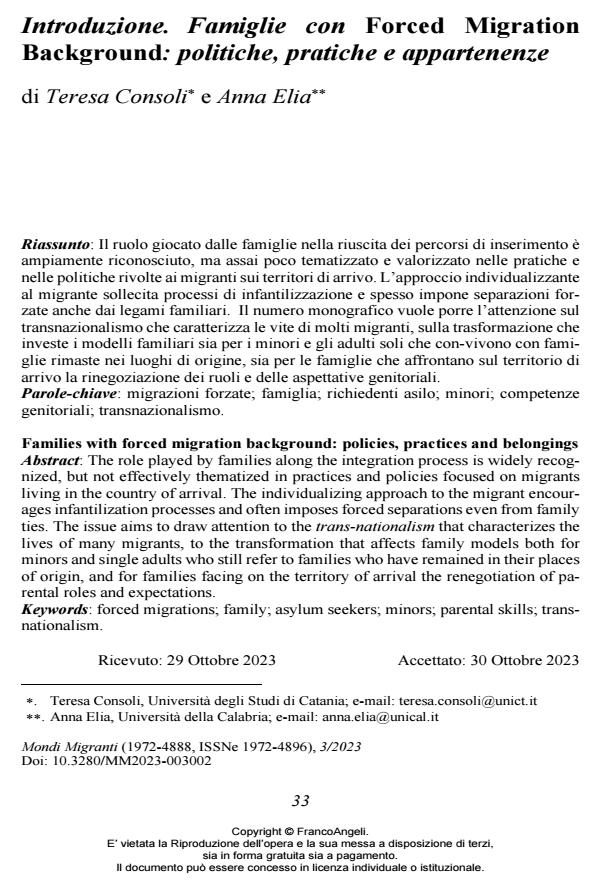Families with forced migration background: policies, practices and belongings
Journal title MONDI MIGRANTI
Author/s Teresa Consoli, Anna Elia
Publishing Year 2023 Issue 2023/3 Language Italian
Pages 11 P. 33-43 File size 215 KB
DOI 10.3280/MM2023-003002
DOI is like a bar code for intellectual property: to have more infomation
click here
Below, you can see the article first page
If you want to buy this article in PDF format, you can do it, following the instructions to buy download credits

FrancoAngeli is member of Publishers International Linking Association, Inc (PILA), a not-for-profit association which run the CrossRef service enabling links to and from online scholarly content.
The role played by families along the integration process is widely recognized, but not effectively thematized in practices and policies focused on migrants living in the country of arrival. The individualizing approach to the migrant encourages infantilization processes and often imposes forced separations even from family ties. The issue aims to draw attention to the trans-nationalism that characterizes the lives of many migrants, to the transfor-mation that affects family models both for minors and single adults who still refer to families who have remained in their places of origin, and for families facing on the territory of arrival the renegotiation of parental roles and expec-tations.
Keywords: forced migrations; family; asylum seekers; minors; parental skills; transnationalism.
- Ager A. e Strang A. (2008). Understanding integration: a conceptual framework. Journal of Refugee Studies, 21. 2: 161-191;
- Ambrosini M. (2019). Famiglie nonostante. Come gli affetti sfidano i confini. Bologna: il Mulino.
- Bergnehr D. (2020). Adapted fathering for new times: refugee men's narratives on caring for home and children. Journal of Family Studies, DOI: 10.1080/13229400.2020.176970
- Bourdieu P. (2003). Outline of a Theory of Practice. Cambridge: Cambridge University Press (7th edition).
- Hyndman J. e Giles W. (2011). Waiting for What? The Feminization of Asylum in Pro-tracted Situations. Gender, Place & Culture, 18, 3: 361-79.
- Kneebone S., Stevens D. e Baldassar L., a cura di (2014). Refugee Protection and the Role of Law: Conflicting Identities. London: Routledge.
- Panichella N., Avola M. e Piccitto G. (2021). Migration, class attainment and social mobility: an analysis of migrants’s socio-economic integration in Italy. European Sociological Review, 37, 6, December 2021: 883-898;
- Parreñas R.S. (2001). Servants of Globalization: Women, Migration, and Domestic Work. Stanford California: Stanford University Press.
- Rania N., Pinna L. e Coppola I. (2021). Parenting in migration: Critical aspects and challenges of “doing family” of refugee families and social workers. Journal of Social Work; DOI: 10.1177/1468017321101468
- Santagati M.G., a cura di (2022). Alunni con background migratorio in Italia. Famiglia, scuola società. Milano: Fondazione ISMU.
- Tarrius A. (2001). Les nouveaux cosmopolitismes. Mobilités, identités, territoires. La Tour d’Aigues: Ed. De l’Aube.
- Tiilikainen et al., eds. (2023). Forced Migration and Separated Families. IMISCOE, Research Series.
Teresa Consoli, Anna Elia, Introduzione. Famiglie con Forced Migration. Background: politiche, pratiche e appartenenze in "MONDI MIGRANTI" 3/2023, pp 33-43, DOI: 10.3280/MM2023-003002